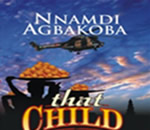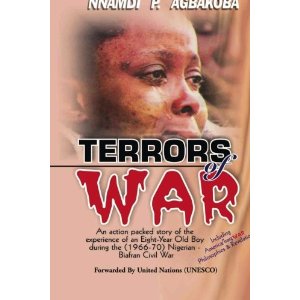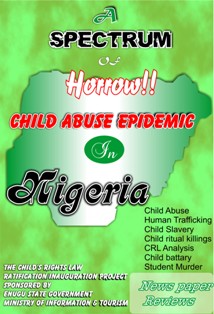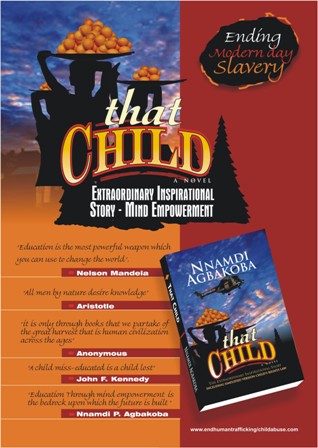Newspaper Reviews
Saturday Champion
AGBAKOBA REVISITS NIGERIAN
REVIEWER: JUSTUS NWAKANMA
IF you read the Terrors of War; an action packed story of the experience of an eight-year-old boy (Nnamdi Agbakoba) during the Nigerian-Biafran civil crisis of 1966-70, and perhaps you forget all the juicy stories in the book, the author would not want you to forget these words:
- War is an irresponsible and reckless solution to resolving differences, indeed it is not a solution but a path to destruction.
- War claims millions of lives. Thousands of families lose loved ones to all kinds of horrible deaths. There is constant wailing and gnashing of teeth during war.
- Hunger and starvation are the inevitable by-products of war.
- During wars, there are no victors but both parties are losers, even when the war is over and one party comes out victorious.
These are just part of what you will get to see when you pick a copy of Terrors of War. In the book, Agbakoba was able to tell the story of the effects and consequences of war on children, the family and the nation at large. In conclusion, he lets us know that for whatever purpose anybody or any nation or community that engages in war, the end result is always disastrous.
THIS DAY
WAXING LYRICAL FOR PEACE
Pictures and poetry of War, by Nnamdi P. Agbakoba, createspace publishers USA
LITERACY CAFÉ
It is a fact, a picture is worth more than a thousand words. The picture of child-victims of war and other pictures of fierce combat zones in Namdi Agbakoba’s book is most evocative of the devastation and hopelessness of war. Pictures and Poetry of War, as the book is titled, is a collection of poetry on war. peace and moral poems that cry for peace. Inspired and written from the personal war experience of a child who was trapped in a real war, it has been endorsed by the UN (UNESCO) as a peace education poetry book, it has also been adopted and approved by the Nigeria Examination Council (NECO) as an exam textbook for JSS Level, nationwide, for the next four years.
Call the book a laudable effort at peace-mongering. The author offers spiritual solutions for the spate of militancy and violence plaguing the country. Its rare collection of words and pictures are carefully crafted and composed to conjure the sequence and spectrum of desperation war evokes in those most closely affected- children. The author offers additional analysis and discussions around some of the poems to give the reader a full understanding of the thoughtful intelligent verses.
Agbakoba’s minces no words as to what his core message is; peace “it is only through patience, tolerance and communication that we can ever live in a peaceful word. A collection of poems that touch and minister to the moral fiber of society are also composed for the up-lifting of moral standards,” he says
The UNESCO endorsement of the book as a peace instrument can be gleaned in the following foreword:
On a closer reading of the book, we discover that the poignant depiction of the dereliction of war in the book, rather than promote a bitter recollection and the need for revenge, redirects the mind to a peaceful course of conflict resolution because war is devastating, destructive and anti-social. The book promotes peace, tolerance and dialogue. These are principles that are at the very heart of the United Nations mandate to UNESCO whose activities are to promote a culture of peace in the world.
“in view of this, we would like to suggest that you solicit the support of the Nigeria Educational Research Development Council (NERDC) to look into adopting your book as one of the resource materials for the Human Rights Education Syllabus for Schools in Nigeria.”
Following on the heals of the UNESCO endorsement, the Nigerian Educational Research and Development Council (NERDC), predicted that demand for this kind of literature dealing with conflict resolution will surely be on the increase considering world events.
Pictures and Poetry of war has also been penciled down by the Nigeria Examination Council (NECO) as one of the books in its syllabus from 2008 to 2013 while the first students to be tested on the text will start from 2011 JSS level NECO examinations.
The author is not all starry-eyed about eradicating war. “One thing we must always remember is war or violence has no cure and war was invented in heaven way before the creation of man,” he says. “War can only be controlled and tamed, it could be kept in constant check and there will be peace. Peace should not be taken for granted. Peace is fragile. A multitude of seemingly little or grave issues can breed violence or war. Both the Quran and the Bible tell us that.
Seeds of future violence and mayhem may have been sowed today, according to Agbakoba. “Seeds are sown into a person by what the person sees, hears or practices. Our seed are our children. What they will or might reflect later – it may take 20 years is what they have seen in the mirror of life today. What are our children seeing today? The answer is very obvious. What has happened in the past must never be allowed to reoccur else the problem will surely be multiplied sevenfold and will require a higher dosage of treatment. These are practical and spiritual truths.
“Peace Education therapy is designed by nature to breakdown what our children are seeing to day, thereby turning poison spirit into a hamless spirit,
“Peace Education is a mandate from the United Nations to all nations of the world. Peace Education neutralizes poison education that our seed (our children) are eating daily from what they see and hear happening around them.
SATURDAY, CHAMPION
THROUGH PEACE YOU CAN RE-ENGINEER THE WORLD – AGBAKOBA
Thought, the name, Nnamdi Paul Agbakoba, may not ring a bell, he is no doubt a man endowed with a vision to guide the world through the divine way to peace. This service to humanity as he tells UZO CHIKERE in this encounter, is his life and passion despite being the executive producer of “Vision Questron Digital ,” a Lagos Television Production Studio. Expectedly, he has written a book espousing the need to nurture peace against terror and war. Read all about it and more in his books Terrors of War Novel and Terrors of war pictures and poetry of war.
Campaign against terror and war:
I’m the executive producer of “Visions Questron”. We make movies, commercials and anything television, I am also into NGO, my NGO is called Society Against Terror and War (SAT-War). Under SAT-War, we’ve written a book and the book is titled “Terrors of War” and it seems to be a very timely book.
It is a book that teaches the philosophies and principles that foster peace or nurture war. Incidentally, I started writing this book in January 2003 with that title oblivious to the fact that war against terror will start in earnest on September the 11th 2013- the day now commonly known as 9/11.
Newswatch
Childhood Memories of War
Nnamdi Agbakoba, who was only eight years old when the Biafran War broke out, recollects his experiences of that period to underscore the importance of a peaceful Nigeria
By Olu Ojewale
Title: Terrors of War
Author: Nnamdi Paul Agabakoba
Publisher: Treasure Publishers Limited, Lagos
Pagination: 210
THIS STORY IS NOT NEW. Many Nigerians young and old, must have heard it. It is the story of how Nigeria was thrown into a bitter four-year civil war all in the name of keeping the nation as one. But many people would not have had the opportunity of hearing the tale from the experience of an eight-year old boy that witnessed and suffered from the carnage of the conflict. Terrors of War is a recollection of Nnamdi Paul Agbakoba, broadcaster and movie producer, as well as the author of the book. In the book, Agbakoba recounts the travails of his family and other Igbo people during the conflict.
The writer starts his narration from his parents and the family’s cosy residence in Jos where the nucleus family consisting of father, mother and six children lived in peace and harmony. It is a story about a well-organized and adequately nourished family life with the children taking rides to school in their dutiful parents’ cars.
Then suddenly, all that was upset by the drumbeat of a looming war that fateful day in 1966, when reports filled the air that people of Igbo extraction were being killed rashly by their hosts in the North. Mayhem, confusion and disorder set in as the Igbo people became the target of tribal hostility, thereby forcing many of them to abandon everything they had to escape persecution and migrate to their respective hometowns in the South – in extreme haste and panic.
The Agbakoba family joined the movement and headed for Onitsha in the South-East. You could almost touch the anxiety and frustration of this well-knit family being thrown into confusion because they could not help or avoid the situation they found themselves.
Their peace turned to misery and the Agbakobas were forced to move from place to place because nowhere was safe any more. In the course of their travails, they were refugees; besieged by hunger, haunted by federal bullets and forced to scrape through many bushes to get food. At a point, two of the children were conscripted into the Biafran army.
Sunday Vanguard
Agbakoba strives to reduce cultism, gangsterism in schools
PAUL Nnamdi Agbakoba, a broadcaster and film producer, is the author of “Terrors of War” an autobiography that recently got the approval of the United Nations Educational, Scientific and Cultural Organization (UNESCO) as a reference book for Peace and Human Rights Education. In this interview with Sunday Vanguard Arts, he reviews the social crises in the country and proffers that the new generation, particularly the young children, should be indoctrinated with the culture of peace and tolerance while the youths must be re-engineered morally.
ON what inspired his writing of the book, Terrors of War?
I read a particular autobiography that spurred my interest at putting together what other members of my family and I went through during the Nigerian Civil War. I was particularly bitter about the conditions that some individuals are presently going through as a result of violence and war in other parts of the world – Iraq, Afghanistan, Serre –Leon and a host of other areas. I perceive this as a cancer of the new millennium. My theme, therefore, transcend all cultures, religions and nations. About seventy percent of the world’s population lives in conditions of fear and uncertainty. We all share a common ailment which this book has treated extensively.
On why UNESCO accredited the work, Terrors of War; I wish to inform you that the headquarters of UNESCO in Paris has recommended that peace and human rights education be included in the academic curriculum of all the tiers of education throughout the world. I had earlier presented my book, which was my childhood experience and diary of the Nigerian Civil War to the agency for review. I believe it was the theme of peace that the book preaches that earned it the recommendation as a relevant material for the proposed new courses in peace education and conflict resolution. Other agencies like the British Council, USIS and UNICEF, have endorsed the work. I am very sure that UNESCO, like other peace-oriented organizations in the world, has given serious thought to the issue of violence, terrorism and disturbances that are becoming permanent features in human existence. We are quite aware of the colossal amount the United Nations has committed to promote peace and reduce conflicts and rehabilitate the victims of war and terrorism all over the world.
SUNDAY COMMENT
AN APOSTLE OF PEACE
In the words of sage; “For to every man is appointed a role in the making of a peaceful world.”
Perhaps, injured by the horrors of the Nigeria civil war (1967-1970), John Pepper Clark, in one of his classics entitled “The Casualties.” Wrote:
“The casualties are not only those who are dead, but they are well out of it.
The casualties are not only those who lost properties, but are well out of it.
It is into this latter category that an Apostle of love and peace Mr. Nnamdi Paul Agbakoba, belongs.
Although too young at age eight to have influenced the pendulum of Nigeria political power and intrigues, which eventually tilted towards war in 1967, the evils, the man inhumanity-to-man and the catastrophe of that inglorious era still hangs like a stubborn stigma in his mind’s eyes.
Apparently disturbed by the threat to world peace as epitomized by America’s intervention in Iraq and Iran, the Sudanese crises, the North Korean question, the Middle East, Nigeria and other boiling cauldrons in the world, Agbakoba, now 48 years old, became the vanguard of the peace movement.
Under the umbrella of a non-violent organization, (Society Against Terror and War (SAT-WAR) that he established years ago, Agbakoba has been on the mission of peace indoctrination with emphasis on peace advocacy, conflict revolution and general social re-engineeering.
With injuries inflicted on some innocent members of the public in the wake of the Nigerian/Biafran 30 months strife still fresh in his memory, Nnamdi Agbakoba who was one of the survivors of that dark episode of the nation’s history has devoted his life to peace advocacy.
We can all see the foggy hints of terrorist activities slowly creeping into Nigeria. With the activities of militant youths in the Niger-Delta region (Justified or not), Nigerians need no louder alarm bell to alert us to tell us we are already walking down the path the Middle East Walked several decades ago Iniobong Ekponta met him.
NEWS STAR – August 11, 2010
A Wordsmith of distinction
Picture and poetry of War is a collection of war, peace and moral poems that speak volumes about the devastation of war and the cry for peace. A picture is worth a million words. The picture of the child-victims of war in the book is most suggestive as to the devastation and hopelessness of war.
Inspired and written from the personal war experience of a child who was trapped in a real war, this poetry book has been endorsed by the United Nations (UNESCO) as a peace education poetry book. It has also been adopted and approved by the National Examination Council (NECO) as an examination textbook for all JSS level students nationwide for the next four years. It is composed to discourage militancy, violence and general wickedness and to promote peaceful co-existence of mankind.
The book is an excellent peace education and spiritual therapy for militancy, violence and other problems checked and controlled by the amnesty.
Pictures and Poetry of War, written by Nnamdi Agbakoba, is a rare collection of words and pictures carefully crafted and composed to conjure the sequence and spectrum of desperation war evokes in those most closely affected - children. The author offers additional analysis and discussions around some of the poems to give the reader a full understanding of the thoughtful intelligent verses.
Agbakoba’s core message is clear throughout, namely, there is no victory in war and no excuse for its wake or militancy, violence, starvation, homelessness and death.
It is only through patience, tolerance and communication that we can live in a peaceful world. A collection of poems that touch and minister to the moral fibre of society are also composed to uplift moral standards.
While adopting the book as one of the best in terms of being an instrument of peace education, UNESCO said it became necessary to give the book a good recognition since it is one of the resource material for human right education.
BUSINESS DAY
TERRORS OF WAR A TOOL FOR SOCIAL REBIRTH
Title: Terrors of War
Author: Nnamdi Agbakoba
Publisher: Creatspace USA,
Pages: 339
Reviewer: Funke Adetutu
In July 1967 Nigeria went to war against itself when the Federal government declared war against the eastern region.
The eastern part of the country led by Odumegu Ojukwu, the them military governor, seceded on May 30th of the same year from the rest of the country and proclaimed itself the independent state of the Republic of Biafra. The war motivated by personal interests and ethnic rivalry lasted for about four years and it brought untold hardship to Nigerians and their experiences gave birth to what could be called the Nigerian war literature. Though most of the Nigeria war novels are fictional, they are also historical as they document the reality of war and the experience of real human beings.
The work of Nnamdi Agbakoba, though autobiographical, could be place on the same level in terms of thematic preoccupation with the works of Chukwu Emeka Ike especially Ike’s well acclaimed novel, sunset at Dawn which is also an account of the civil war. Terrors of war (2004), is a long narrative on the brutality of war and its psychological effects on the Nigerian people told from the point of view of an eight year old child. The novel tells the true story of little Agbakoba whose family resides in Jos until the outbreak of the war in 1966.
Like every other morning, the day the war began is devoid of any sign of the impending doom that is about to befall the members of the Igbo community who lived in Jos at the time. The usual school day started for Agbakoba and the members of his class calmly until mid day when everyone started running helter skelter when the news of the war is announced. Like the author every other child about and below his age are ignorant of the damaging effect of the war.
This innocence is revealed when Agbakoba waves his class prefect William goodbye in the midst of the commotion-he surely did have time for some pleasantries in spite of the ensuing confusion. The young lad though conscious of the pandemonium around him, does not fully comprehend the true meaning of the war that was about to swallow his life, a war he never started and knew nothing about.
Agbakoba, therefore is a symbol of all innocent minds in Nigeria both young and old who are forced to fight a war they never understood. They are just victims of selfish leaders who see them as tools they can use to achieve their selfish objectives.
The effect of the war till date remains unquantifiable, as many homes are broken, hard earned money and investments are destroyed while the decomposing carcasses of human beings, which litter the street could not be differentiated from that of animals. All these harrowing experiences did not escape the detailed eye o of the author.
The novel is well structured with short chapters of a length of about two pages or more each and quotes from renowned poets, historical figures and the holy bible which serve as summaries of the author’s idea and pointers to what the reader should expect in the next chapter.
The inclusion of over 70 original pictures of Nigerian/Biafra civil war brings to life the experience of the Nigerian and Biafra people during this horrendous holocaust in the evolution and history of Nigeria.
The narrative is also didactic in its deposition as it takes the issue of war away from the Nigerian context to the American led war against Iraq in 2003. This act that toppled the Saddam Hussein government is described by the author as barbaric and he calls on world leaders to learn from the Nigerian example.
Agbakoba has not only proven that he is a novelist, is short poem titled, short is the journey of life reinforces the brevity of life with the author’s allusion to the lily flower whose life span ends in summer. This also ushers in Agbakoba’s admonition to Nigerian universities undergraduates to deist from occultism. To this end, the author has succeeded in stating categorically the selfish motives of Nigerian leaders and the ethnic rivalry that still exist in Nigeria today, with an emphasis on the lasting repercussion of the war of 1966 which is still evident in the life of Nigerias through the various characters and with the use of the first person narrative point of view.




.jpg)

.jpg) Purchase terrors of War on Amazon
Purchase terrors of War on Amazon